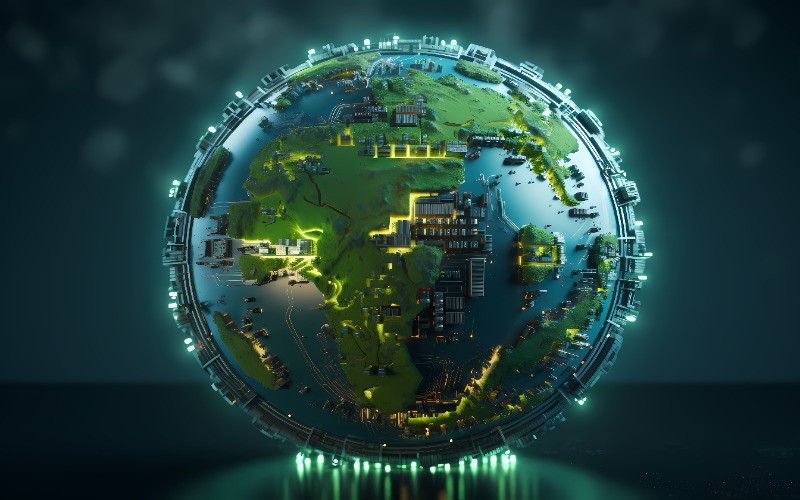With the rise of Artificial Intelligence (AI), there has been much debate over whether its influence will ultimately have a negative or positive effect on our lives. On one hand, AI has the potential to inherit and even amplify biases present in its training data, exacerbating existing inequalities. On the other, AI can significantly augment human capabilities and enhance decision-making processes, allowing us to scale change at a rate we’ve never seen before. Yet this duality only serves to highlight AI as a neutral tool; its impact is determined by how it is leveraged. When applied ethically, AI can become a powerful force for positive change, particularly when it comes to climate action.
Given the increasing urgency of the climate crisis—with May 2024 being the warmest May on record globally and the Atlantic hurricane season predicted to have above-average activity—addressing climate change has never been more critical. According to the World Health Organization, nearly 4 billion people already live in areas highly vulnerable to climate change, underscoring the necessity for powerful, scalable solutions.
Leveraging AI for Climate Resilience
More and more, AI is proving adept at offering innovative solutions to some of the most pressing climate-related challenges of our time. For instance, scientists at the University of Leeds have developed an AI system capable of mapping large Antarctic icebergs from satellite images in just one-hundredth of a second. The speed and accuracy of the system not only enhance our understanding of glacier dynamics but also contribute to more robust models for predicting sea-level rise.
At the Salk Institute, scientists are harnessing plants’ natural ability to draw carbon dioxide from the atmosphere by optimizing their root systems for greater carbon storage, an effort that utilizes a sophisticated AI tool called SLEAP. This software tracks multiple features of root growth, significantly accelerating the research process. Likewise, to address the increasing frequency of natural disasters, a partnership between IBM and the University of Illinois has developed an AI model aimed at anticipating heavy rainfall and flash floods, starting in the Appalachian Mountains. This model represents a significant advancement in early warning systems, potentially saving countless lives and reducing financial loss by providing communities with more timely and precise alerts.
Creating Sustainable Biomaterials at erthos
Similarly, erthos is a climate technology company that is leveraging AI to meet the urgency of the climate crisis by tackling the world’s plastic crisis. In particular, we streamline the research and development of sustainable biomaterials. Our proprietary machine-learning platform, ZYA, plays a pivotal role in this process. By analyzing vast datasets, ZYA identifies optimal combinations of biobased ingredients that can replace traditional plastics while maintaining the desired material properties.
This AI-driven approach enables us to design next-gen materials that are not only environmentally friendly but also competitive in terms of performance and cost. We’ve effectively closed the gap between ideation and commercialization for an end-to-end design process that is five times faster than traditional methods, leading to a 92% reduction in cost. While our biomaterials offer properties comparable to traditional plastics like polypropylene and polystyrene, they exhibit a significantly better environmental footprint.
One of the key advantages of using AI in our R&D process is the ability to rapidly iterate and test new formulations. Through our method, we have curated hundreds of patented ingredients and industry-tested materials. Traditionally, creating these materials would have taken years of trial and error. With AI, we can simulate thousands of potential combinations in a fraction of the time, identifying the most promising candidates for further testing. This accelerates our development cycle and reduces costs, making sustainable biomaterials more accessible to a broader range of industries.
The Path Forward
From mapping Antarctic icebergs to optimizing carbon sequestration in plants and improving early warning systems for natural disasters, AI is proving to be an invaluable tool in our quest for sustainability. At erthos, our AI-driven approach to creating biomaterials as plastic alternatives showcases the transformative impact of technology when applied with intention and purpose.
Our mission to rapidly reduce the global dependency on plastics guides our AI utilization within an ethical framework. In centering the communities on the frontlines of the plastic waste crisis, we ensure that we remain accountable in our use of AI and avoid the pitfalls of its biases. To fully realize the potential of AI in combating climate change, it is essential to continue investing in these solutions and fostering collaboration across industries. By doing so, we can accelerate the development and implementation of innovative technologies that promote a more sustainable and resilient future for all.











